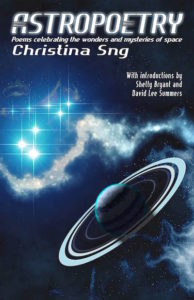The Q&As with Speculative Poets Series features interviews with writers of science fiction and fantasy poetry. For the December 2018 edition of this series, I spoke with poet Christina Sng about her book, Astropoetry (Alban Lake Press, 2017), which placed second in the chapbook category of the 2018 Science Fiction & Fantasy Poetry Association’s Elgin Awards.
Christina Sng is the Bram Stoker and Elgin Award-winning author of A Collection of Nightmares (Raw Dog Screaming Press, 2017) and Astropoetry (Alban Lake Publishing, 2017). Her work has appeared in numerous venues worldwide, translated into six languages, and garnered over 70 awards and nominations, including the 2018 Jane Reichhold International Prize, the 2016 Harold G. Henderson Award, and Honourable Mentions in the Year’s Best Fantasy and Horror and the Best Horror of the Year.
Q: Space is vast, but your poems are brief and compact. What drove your choice of short forms in writing about asteroids, moons, planets, stars, and even galaxies and human exploration of them? How did the traditions of the short forms you used speak to the way you approached your subjects?

Christina Sng: Since I was a child, I’ve always wanted to be an astronaut, to go out there and see the universe. The vastness of space and all its magnificent objects gives us an infinite source of inspiration to write about.
Writing in short forms is an act of necessity rather than choice. Busy days of caregiving don’t afford me hours of immersive writing but instead offer shards of time where I carve out a tiny story in three or five lines, reminding me of the pulsed glimpses we see of celestial objects through our telescopes.
I’ve grown to love the brevity of short forms, how it reflects the little time we have on this world, how they’re like small puzzles we need to fit together like the mysteries of space, how each word means so much, and how we weigh one word over another to sculpt a poem to its final form.
Q: The poems in your collection both give celestial objects the weight of their own stories, their own volition, and yet they also acknowledge that the observer must be a part of those stories. We see “The Sun is furious” (“ENCAPSULATED”) and “You collect dust like dolls” (“MERCURY”). And yet, later, in “THE TWIN LIGHTS ON CERES,” for example, the lights on the asteroid are “my eyes/ Looking back at yours.” As the collection progresses, humans begin to dominate the stars, planets, asteroids, and so forth, which become less anthropomorphized. Do you see the stories we tell about space as progressing as such? And do you see the stories we tell about space as part of the human exploration or domination of what is beyond Earth?
CS: I see the journey through my collection as an expansion of our experience in the universe where it becomes less and less about us and more about how minute we are in the whole scheme of things, and most significantly, how amazing it is that we are around to observe it.
I’d like to think that our stories reflect the awe and wonder of how we feel when we look up into space yet at the same time also reflect our nature to conquer and destroy.
Q: The poems at the end of the collection speak to a sort of absorption of its human explorers by the universe. I was particularly moved by “REMNANTS,” in which the speaker of the poem acknowledges that what will become of people is “Memory remnants/ Fragments of us.” Do you see the stories that we tell about space as consuming us in the same way? That we become part of the poetry we create about what we cannot (yet) reach?
CS: Yes, I believe they do. Each story we tell is a fragment of our lives, our hopes, and our dreams. They become a remnant of us, immortalized in the things we create that endure after we are gone and in the memories of the people who remember us.
Q: Are there any speculative poetry titles you’d like to recommend? Or, more specifically, collection that work toward “celebrating the wonders and mysteries of space” as your poems do?
CS: Perhaps not a title but two science fiction journals, Star*Line and Scifaikuest, curate some of the best space poems I’ve read.